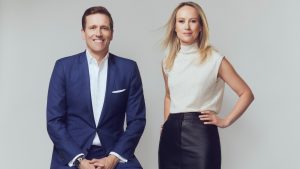
Media companies have made major mistakes in reacting to technological change in the past that must be avoided amid the rise of artificial intelligence. That was the message shared by David Rhodes, executive chairman of Sky News and the former CBS News president, and Almar Latour, CEO of Dow Jones and publisher of The Wall Street Journal, both part of News Corp, during an appearance at the Wall Street Journal CEO Council Summit in London on Wednesday.
They spoke in a session, which was live-streamed and entitled “Media, Machines, and Mayhem: Truth as a Competitive Advantage.”
“There is a failure of imagination” when it comes to a vision for AI, Rhodes argued. “Right now, we talk about generative AI and talk about answers to prompts, and we think only about text. But what’s really important to us is to be a design partner with all of the firms … on what it looks like when something much more compelling happens, which is when these models come for video. We do want that design partnership.”
Of course, the appropriate business and financial models for AI companies to use media content remains a key focus and issue of debate. Various media companies have struck licensing deals with one AI company while suing another. “We also want to advocate for good terms of trade, for how our information, how our results turn up in answers to those prompts,” Rhodes highlighted in that context. “We need to not repeat what were the errors of the news media in approaching Web 1.0 and even Web 2.0 and social media, where big mistakes were made.”
Latour echoed that when sharing his company’s approach to AI. Dow Jones has struck a licensing deal with OpenAI, but it sued Perplexity AI.

“We want a commercial arrangement with all the AI platforms. That’s the foundation of it. Information has value, and we need to, through a market mechanism, arrive at that value,” he emphasized. Highlighting that Dow Jones spends $1.7 billion every year “to perform the little miracle that is the Wall Street Journal and all of our other information,” he highlighted that nobody can expect to “take all of your productivity from this year… give it away for free, move it into the AI machine,” and take 130 years worth of archives without appropriate pay. “We’re not going to let that happen. We need fair value for that, or otherwise, there’s not going to be any news,” the CEO concluded.
He didn’t mince words in his follow-up comments. “So we want to strike commercial arrangements. If you do not agree to that, you are a thug, and we’ll come after you like a common thief,” Latour shared. “We will see you in court, and we will argue our case. And that may sound belligerent, but it is a necessity.”
Rhodes on Wednesday didn’t comment on the litigation brought by U.S. President Donald Trump against CBS News over how 60 Minutes edited his former opponent Kamala Harris’ answer to a question. The two sides have been in mediation talks to try and resolve the suit, with Paramount reportedly to have offered $15 million to resolve the suit. The Federal Communications Commission is also reviewing the interview via its “news distortion” purview while also reviewing CBS parent Paramount Global’s deal to sell to Skydance Media.
So, is there press freedom in the United States right now? “Yes, there is press freedom,” replied Latour. “I get asked this question all the time, particularly when I’m traveling abroad. Our journalists can freely report, and our opinion writers are free to share their free markets, free people philosophy richly.”
He continued: “There is a free debate. The President, of course, and the administration is free to respond to that, and the decibel level has gone up. But I think there should not be hysteria.” Concluded Latour: “The tension between an administration and established media, or other media, is common. We got clobbered when the Wall Street Journal did a front-page story on President Biden’s cognitive decline, and that was not very comfortable. The decibel level has definitely gone up.”

That conclusion wrapped up the session. “In a world where seemingly every voice has a platform, where narratives can make or break a business, and where public trust in corporations and institutions has rapidly eroded, the mission of global news organizations has never been more vital – or more complex,” its description said.
#Sky #News #David #Rhodes #Dow #Jones #CEO #Thugs #U.S #Press #Freedom






